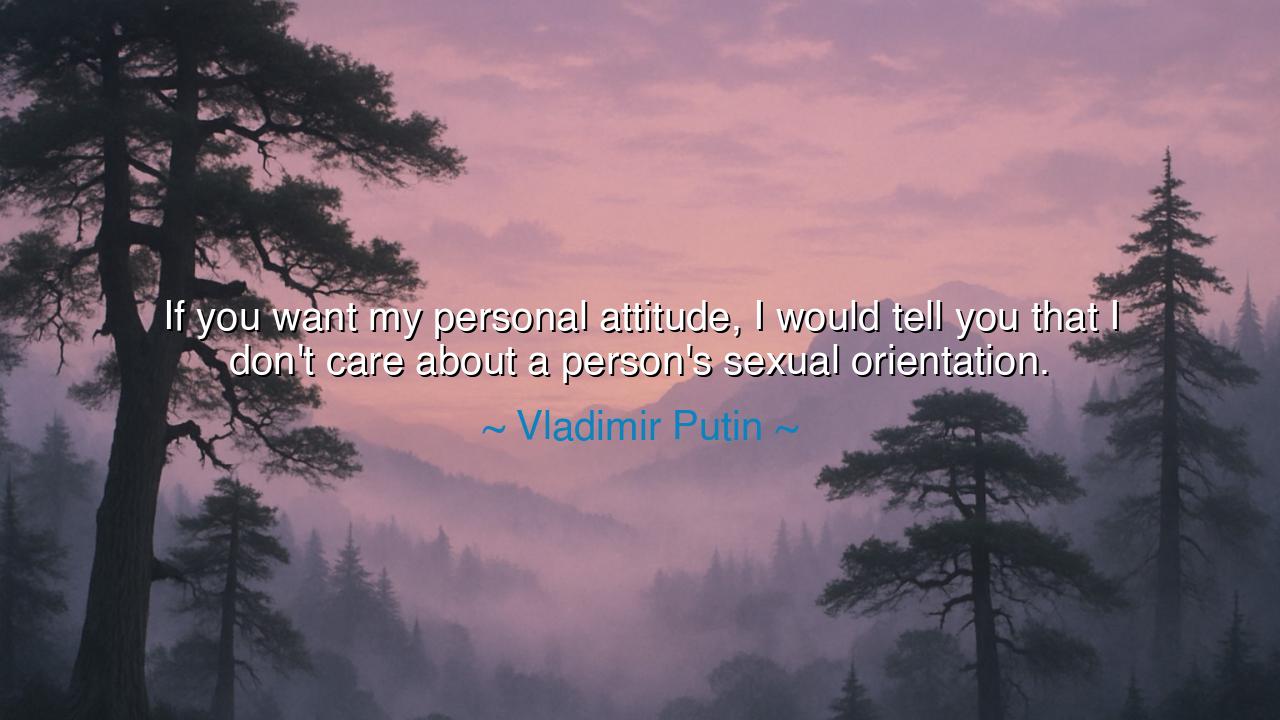
If you want my personal attitude, I would tell you that I don't
If you want my personal attitude, I would tell you that I don't care about a person's sexual orientation.






Host: The room feels oddly quiet, as if the words themselves are weighing in the air between Jack and Jeeny. The soft light from the lamp beside them creates long shadows, its warmth barely reaching the corners of the room. Jack is leaning forward, his hands folded together as he listens intently, while Jeeny sits across from him, her posture relaxed but thoughtful. The atmosphere is calm, yet the subject at hand is anything but.
Jack: (his voice measured, almost curious) "You know, that quote from Vladimir Putin keeps sticking with me. 'I don’t care about a person’s sexual orientation.' On the surface, it sounds like a step toward tolerance, right? Like he's saying, 'It doesn’t matter.' But then, I start to wonder—does it really mean anything if you just don’t care? Is indifference enough, or is there more to it?"
Jeeny: (pausing, her voice thoughtful) "I think that’s the tricky part. Indifference can be a form of tolerance, but it doesn’t necessarily lead to acceptance. Tolerance is one thing—it’s saying, 'I won’t stop you from being who you are.' But acceptance goes beyond that. It’s about understanding, embracing differences, and actively supporting someone, not just letting them be. I don’t think indifference is enough to create a truly inclusive environment."
Jack: (nodding slowly, his tone shifting) "Yeah, I get that. Indifference can feel like you’re just neutral, but it also means you’re not doing anything to actually support the person. If you don’t care, then you’re not engaging with the real issue, right? It’s like saying, 'You can be who you are, but I’m not going to get involved.' And that’s not the same as actively standing up for someone."
Jeeny: (her voice firm yet compassionate) "Exactly. Tolerance without action is passive. You can say you don’t care about someone’s sexual orientation, but if you're not willing to advocate for their rights, if you're not willing to celebrate who they are, then that indifference can inadvertently perpetuate inequality. True acceptance is about more than just letting people be—it’s about recognizing their humanity, their worth, and standing beside them."
Host: The silence that falls between them feels like a reflective pause, the weight of the conversation settling in. The world outside continues on, but inside the room, Jack and Jeeny are wrapped up in the complexity of indifference versus acceptance—and what it means to truly care.
Jack: (his voice quieter now, thoughtful) "So, you’re saying that indifference doesn’t do enough? It’s not about just not caring, but about engaging and supporting the people who need it the most. Not just standing back, but stepping in."
Jeeny: (smiling softly, her voice gentle) "Exactly. Tolerance can be passive, but acceptance is active. It’s about not only saying, 'I don’t care' but also showing, 'I care enough to stand with you, to support you.' That’s the difference—it’s about action, not just words."
Jack: (nodding, his tone more resolved) "I think that’s what’s been bothering me about that quote. It sounds like the bare minimum—'I don’t care.' But caring is more than that. It’s about action, about standing for something. If we really want equality, we can’t just say we don’t care about orientation—we have to care enough to fight for it."
Host: The room feels quieter now, as if both Jack and Jeeny have reached an understanding that goes beyond the words. The light outside has shifted, and with it, there seems to be a shift in their conversation—a deeper recognition that true change comes from engagement, from not just tolerating, but accepting and supporting one another. The conversation lingers, quiet yet powerful, as the evening fades into night.






AAdministratorAdministrator
Welcome, honored guests. Please leave a comment, we will respond soon